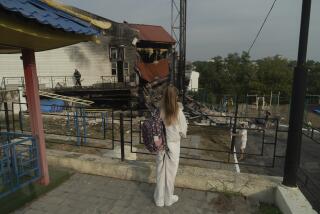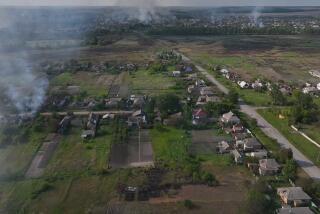Chechnya War Wipes Out School System in Its Capital
GROZNY, Russia — Musa and his pal Ali should have been starting the seventh grade Sept. 2.
Instead, the ragged pair spent the day begging at bombed-out street corners and searching ruined buildings for bullets and grenades, which they like to explode by tossing them into fires.
As a new year of classes began in much of the world, school was not foremost in the minds of children in the Chechen capital. They had no choice--every school in the pulverized city has been destroyed or shut down.
“We have nothing to eat, practically no clothes, nowhere to go,” said 12-year-old Musa Magomadov, shrugging. His face, hands and clothes were smeared with grime.
“We can’t go to school.”
Chechen villages also have lost schoolhouses in the 21-month war. But on the traditional first day of classes, with a 10-day-old truce holding firm, many schools outside Grozny reopened on schedule.
All along the roads of the tiny republic, girls with bows in their hair and boys lugging Teenage Mutant Ninja Turtles and Lion King backpacks clutched bouquets of flowers for their teachers as their parents escorted them to school.
In Grozny, however, thousands of children near ground zero of the war had no such distractions from their grim surroundings.
Some roamed the central market--buying, selling or begging. Others helped their families clean the wreckage from the last round of deadly fighting and bombing.
A boy wearing the green headband of Islamic fighters clutched a make-believe gun as he rode a rickety bike down a dusty, brick-strewn street.
Some schools in Grozny--which had a population of 400,000 before the war--struggled back into operation last year, often being repaired under the assumption that the worst was over. But after last month’s fierce battle for the capital, few are intact.
At Middle School No. 9, a grenade or missile has left a gaping hole in the roof. The facade is smashed open, all the windows are broken and the outer walls are riddled with bullet holes. The charred remains of three Russian tanks lie half a block away.
Luisa Ausheva, a geography teacher, gazed in pain at the silent hulk.
“A person can’t even imagine that somebody would do this,” said the 45-year-old woman, returning to the city after fleeing the last Russian bombing.
“Awful. Terrible. I can’t even talk about it,” she said, her voice catching before she turned and hurried away.
Inside, Musa and his buddy, Ali Latayev, wandered the rubble-strewn hallways and devastated classrooms.
They are even unluckier than most Grozny children. Their parents were killed or disappeared in the war, and they sleep in half-abandoned apartment buildings where people offer them space.
Rizvan Madar, a 7-year-old orphan tagging along with the big kids, picked up a piece of chalk and started drawing idly on the still-intact blackboard. First a tank, then a helicopter, then a woman--underneath whom he wrote, “Mama.”
None of the three boys hesitated when asked what they wanted to be when they grow up. Fighters, they said.
Across the city, the head of the wrecked Secondary School No. 32 warned curiosity-seekers to stay away from the playground. One child had already stepped on a mine there and been wounded.
A boy approached the school director, Hasan Gakuyev, and asked hopefully: “Is school opening soon?”
Gakuyev smiled sadly and shook his head.
More to Read
Sign up for Essential California
The most important California stories and recommendations in your inbox every morning.
You may occasionally receive promotional content from the Los Angeles Times.










